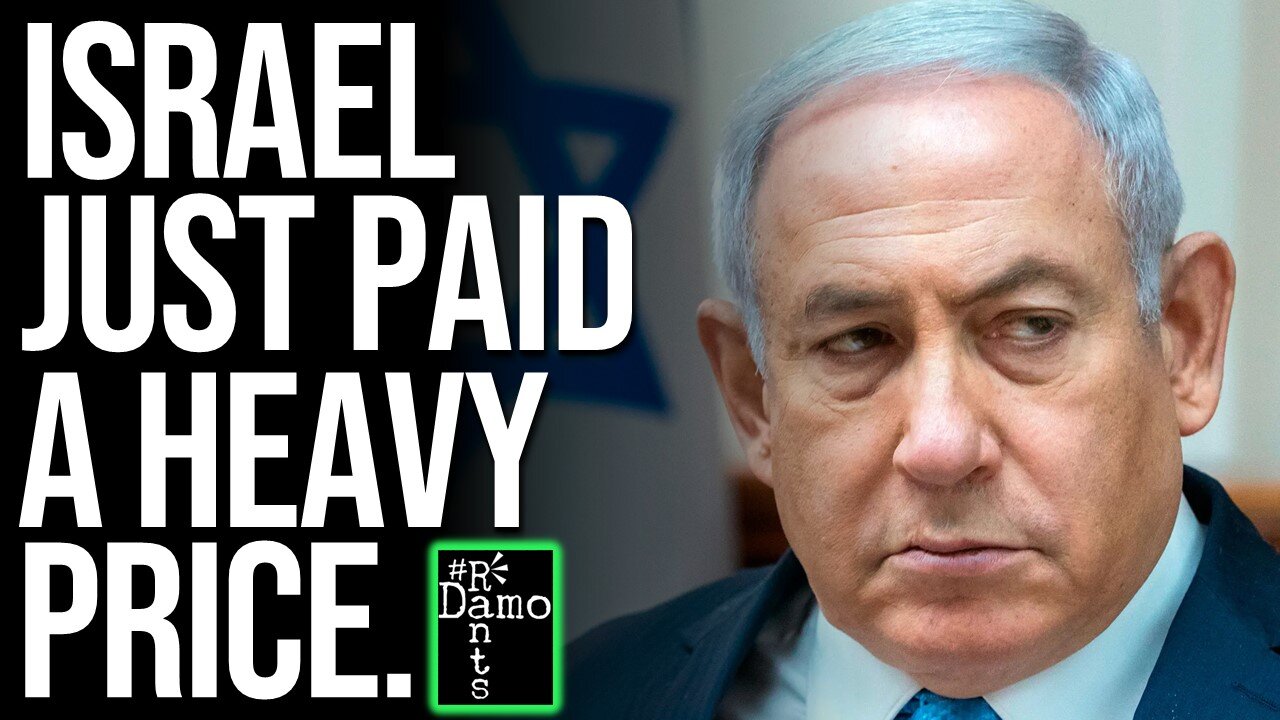Premium Only Content

Israel Thought It Could Ignore BDS—They Got It Very Wrong
Right, so when a shipping titan like Maersk packs up and sails away, and a medical authority like the British Medical Association ditches you faster than a faulty stethoscope, and the World Council of Churches all unite in prayer for your victims - all cutting ties with Israel as they have— all within weeks of each other—it amounts to being something more than just ongoing scattered dissent. It marks BDS growing into a bigger and bigger global reckoning for the genocidal apartheid state. For too long sneered at and dismissed as marginal activism, the Boycott, Divestment and Sanctions movement is now steadily embedding itself in the decisions of major corporations, financial institutions, trade unions, and even sovereign governments. The number of major BDS victories over just the last few months are significant, but as usual, the mainstream media have ignored it. These aren’t symbolic gestures. They are massive shifts in how Israel is seen—and increasingly, how it is avoided.
What started as a grassroots call to boycott Israel for its occupation of Palestine has grown into a transnational campaign that blends ethics, law, and economics. The results are already reverberating through boardrooms and parliaments, pushing Israel into a defensive posture unprecedented in its modern diplomatic history. The global BDS movement is not only damaging Israel’s international standing and economic interests but also positioning itself as a legitimate, institutionalised pressure mechanism—with the potential to trigger long-term diplomatic and financial isolation, actual consequences that will hold Israel to account.
Right, so, the BDS Movement - founded in 2005 by a coalition of over 170 Palestinian civil society organisations, the BDS movement drew inspiration from the anti-apartheid struggle in South Africa. Its aims were specific: an end to the occupation of Arab lands, equal rights for Palestinian citizens of Israel, and the right of return for Palestinian refugees. For years, BDS has been treated as a fringe nuisance though—largely ignored by governments, vilified by pro-Israel lobbyists, and criminalised in several Western jurisdictions.
But the landscape began shifting dramatically after Israel’s actions in Gaza following the events of October 7th and which have now been going on for nearly 2 years. The global response to Israel’s assault on civilians, healthcare facilities, and aid convoys provoked mass protests across Europe, the Global South, and even in parts of North America. Social media campaigns calling for divestment went viral. Boycotts of brands seen as being complicit gained mainstream traction. Most importantly, powerful institutions began to listen. The BDS movement had entered a new phase: from civil disobedience to systemic disruption and we’ve seen this accelerate particularly in recent months.
One of the most significant blows to Israel’s commercial ecosystem came just last month, when Danish shipping giant Maersk confirmed it would divest from firms operating in illegal Israeli settlements in the occupied West Bank. As reported by Al Jazeera and Press TV, the decision followed intense scrutiny from activist networks including the Palestinian Youth Movement and the “Mask Off Maersk” campaign, which exposed Maersk’s involvement in transporting goods and military components linked to settlement infrastructure and Israeli air power.
The campaign was international in scope, with actions across Copenhagen, North Africa, and Australia. As Quds News noted, it forced Maersk to align with UN Human Rights Council guidelines on business activity in occupied territories, the bad press they were getting, BDS actions against it, the aforementioned campaigns brought enough pressure to bear that in the end the company has relented. In essence, it proved that sustained, transnational BDS activism could disrupt the operations of a major global logistics firm—an industry that underpins Israel’s ability to maintain its military-industrial and economic networks, it is totally reliant on such aid coming from beyond the Middle East.
When international corporations begin applying ethical supply chain criteria to Israel, the reputational cost of association becomes too high to ignore.
Around the same time, FedEx became the subject of a criminal complaint in Belgium over the alleged shipment of F-35 fighter jet parts to Israel. The case, as covered by The Cradle, was filed by the Belgian peace organisation Vredesactie, accuses FedEx of complicity in war crimes due to its logistical role in transporting weapons later used in Gaza bombings.
Though this case is ongoing, its implications are still severe. It marks a rare but potentially precedent-setting use of international humanitarian law to prosecute corporate complicity in genocide. It also signals to other transport firms—like DHL, UPS, and cargo airlines—that BDS-aligned legal challenges are no longer empty threats. Companies now face not just public shame but real courtroom jeopardy.
Should the Belgian courts proceed, it could open the door to a wave of litigation across EU states where universal jurisdiction laws are active. This escalation of BDS strategy—from consumer activism to legal prosecution—represents a new and really significant front in the campaign.
Italy’s largest consumer cooperative, the supermarket chain Coop Alleanza 3.0, also joined the BDS movement at around the same time as Maersk and the FedEx case began, announcing it would stop selling Israeli products in its stores, from peanuts, to tahini to SodaStream products. According to Quds News, the decision was triggered by grassroots pressure as well as a switch by consumers out of choice, to non Israeli alternatives, including Palestinian owned goods like “Gaza Cola.”
This move is significant because it bridges retail and politics and demonstrates the impact ordinary working class people can have in boycotting Israel themselves. When large supermarket chains—often wary of controversy—take public positions on geopolitical matters, it reflects not just activist pressure, but changing consumer preferences as well, the research and investment supermarkets do into consumer spending habits is massive.
Now, for as welcome as such retail boycotts, are, they may not devastating Israel’s GDP quite yet, this is one supermarket chain in one country, but they do strike at its soft power and its brand appeal. And when major retailers take that first step, they create precedent for others.
Perhaps the most stunning institutional development came from the World Council of Churches (WCC), which again, all around the same time, the end of June, a really bad week for Israel wasn’t it? They adopted a resolution calling Israel an apartheid state and urging member churches to support sanctions, divestment, and arms embargoes as covered by Skwawkbox, and showing these churches represent true Christian values, unlike the evangelists of the US, some of whom are overseeing those appalling so-called aid hubs being run by the GHF in Gaza.
So what about some churches you might be thinking. The WCC represents over 500 million Christians globally. By framing the Israeli occupation as a theological and moral issue, it compels faith-based institutions—many with significant investment portfolios—to consider divestment and boycott policies. More than that, it adds legitimacy to BDS from within the Western religious establishment, long seen as hesitant to alienate Jewish communities or political allies, that is certainly true in the UK with some of the faith leaders we have here.
The resolution, passed in Johannesburg, invoked international law, the Rome Statute, and the Geneva Conventions. Its wording made it clear: to remain silent in the face of Israel’s crimes is no longer tenable. It’s not very Christian is it?
Another key BDS victory has come from Norway, this one is something that has been on the cards for a while where KLP—the country’s largest pension fund—divested from multiple companies supplying equipment to the Israeli military. The fund cited ethical concerns related to the genocide in Gaza and breaches of international humanitarian law.
And this action follows a history of ethical divestments by Nordic funds, but what sets KLP apart is the direct invocation of BDS-aligned logic. The decision to blacklist firms like Oshkosh and ThyssenKrupp sets a precedent in the financial services world. If other funds follow suit now that again here a precedent has been set, Israel’s access to global capital could begin to narrow or at the very least more expensive.
For a country that relies heavily on international arms procurement and export, this is a major strategic vulnerability. Israel can be hurt here.
The British Medical Association (BMA), the UK’s leading medical trade union, voted earlier this month to sever institutional ties with the Israel Medical Association and oppose NHS data cooperation with Palantir, citing its complicity in Israeli war crimes and again its Skwawkbox with its excellent coverage of all things relating to Israel and Gaza picking this story up as well.
The motion, passed with over 80% delegate support, signals a powerful shift in the ethical stance of one of Britain’s most respected professional bodies. It reflects growing concern among health professionals that Israeli bombardment of Gaza—including targeted strikes on hospitals and ambulances—renders any neutral association with Israeli health bodies morally untenable.
This development is also crucial and significant because the medical field is typically insulated from direct boycott activity. When doctors start walking away, it means the cost of complicity is penetrating even the most cautious sectors, but of course British doctors who have been out in Gaza and have been the ones seeing what Israel are doing first hand, so perhaps we shouldn’t actually be surprised that the BMA have ended up going down the BDS route as well.
To understand the full significance of all of these developments, it’s worth looking at where it worked before, why we know BDS works. The anti-apartheid boycott campaign in South Africa took decades to mature, it took a long time. It began with protests, progressed to university and church divestments, and eventually forced multinational corporations and Western governments to sever ties.
Israel is now facing a comparable trajectory.
Like South Africa in the 1980s, it increasingly finds itself diplomatically cornered, morally exposed, and economically targeted by a decentralised but determined movement. The difference is speed. Social media, global protest networks, and legal tools unavailable to anti-apartheid activists are accelerating the BDS movement’s reach.
If the 1980s were the decade of disinvestment from Pretoria, the 2020s may be the decade of disinvestment from Tel Aviv.
What makes this wave of BDS action different is its movement from symbolic pressure to legal liability. Companies like FedEx are being hauled into court. Governments like Belgium and Norway are enforcing bans and divestments based on international humanitarian law. The World Council of Churches is framing support for Israel as complicity in apartheid and genocide.
This legal reclassification matters. Once war crimes become a plausible charge—not just a political accusation—then banks, insurers, and institutional investors start running compliance risk assessments. The spectre of ICC indictments or universal jurisdiction arrests could change how Israel is treated in global commerce.
Already, UK and EU trade talks with Israel have stalled and for all the reasonings politicians might give for that, the risk of complicity in what they know Israel are doing is the biggest driver in reality in my view. If more states follow suit, BDS could evolve from a consumer movement to a diplomatic reality.
If the current trajectory of BDS success is any indication, Israel is approaching a critical inflection point. The economic damage inflicted so far has been targeted, not total—but the trendlines point toward mounting isolation. These are not isolated acts of protest but symptoms of a broader recalibration: of corporate ethics, institutional values, legal norms, and geopolitical risk. What began as consumer pressure is now evolving into structural disengagement. And with an economy already in real trouble and investment seen, particularly after the conflict with Iran as extremely risky, the implications for Israel’s future are stark.
The financial front is likely to see the most immediate escalation. Norway’s KLP is unlikely to remain alone in its ethical divestment from companies supplying the Israeli military. Other pension funds—especially in Scandinavia, the Netherlands, and Canada, where environmental, social, and governance (ESG) investing is a deeply entrenched principle—will now face mounting internal and external pressure to follow suit. Institutional investors are inherently risk-averse. Once Israel is widely seen as sufficiently a liability—its not quite there yet it seems-not just morally, but legally—those responsible for managing public money will begin screening for exposure. The logic of fiduciary responsibility will increasingly dovetail with the goals of the BDS campaign. This will not just impact Israeli firms, but multinational contractors—like Elbit Systems, Caterpillar, or firms linked to cyber-surveillance—whose operations are increasingly tethered to the Israeli security state.
Running parallel to all of this is the growing legal dimension of BDS activity. The criminal complaint filed against FedEx in Belgium may be just the first of many. Under the doctrine of universal jurisdiction, European courts can prosecute individuals and entities for war crimes, regardless of where they occurred. If FedEx is found complicit in shipping arms used in attacks on civilians, it will establish a formidable precedent. Lawyers across the continent, emboldened by such a win, will likely test similar complaints in France, Germany, the Netherlands, and Spain. The legal strategy of BDS is clear: treat complicity with Israel’s war crimes not as a matter of opinion, but as a matter of law. In this context, companies and even state actors may soon face lawsuits and judicial investigations that force disclosure, disrupt contracts, and undermine the presumption of impunity Israel has long relied on.
Culturally, the movement is also deepening its reach. Universities, once reluctant to endorse boycott measures, are increasingly becoming flashpoints of moral contestation. From the City University of New York’s divestment vote to student sit-ins at Oxford, Harvard, and the Sorbonne, academic institutions are being called to account. As Israel's actions in Gaza continue to dominate headlines—particularly attacks on schools, hospitals, and universities—the pressure on global academia to sever ties will only intensify. Moreover, artists, musicians, and filmmakers are increasingly refusing to appear in Israeli-sponsored events or festivals, citing the moral cost of neutrality, look at Kneecap or Bob Vylan or the treatment figures such as Gal Gadot are getting to see that. These cultural boycotts serve a dual function: they isolate Israel within the global arts and intellectual communities, but they also amplify the message that what is happening in Palestine is not just a political issue, but a civilisational one. It begs the question of how human we all think we are if we tolerate this.
Finally, the technological sector may emerge as one of the most volatile theatres of BDS confrontation. Companies like Palantir and NSO Group, which have built lucrative relationships with the Israeli state, are now facing backlash far beyond the world of politics. When the British Medical Association cited both Gaza and Palantir as grounds for severing ties, it sent a message that Israeli-linked firms in healthtech, cybersecurity, and data analytics are no longer viewed as neutral or apolitical. Contracts may be cancelled not just because of public protest, but because of compliance requirements, procurement policies, and internal ethics standards. Tech firms, especially those expanding into AI and surveillance, will find that their partnerships with Israeli entities come under increasingly hostile scrutiny and that hurting them in their pockets and through their other associations makes working with Israel less financially beneficial. For a state that has long sought to position itself as a “start-up nation,” this reputational vulnerability could have far-reaching consequences.
In short, the global BDS movement is not merely protesting against Israel’s policies. It is laying the groundwork for systemic exclusion—financial, legal, diplomatic, cultural, and technological. The walls are not yet fully closed, but they are closing. And unless Israel takes radical steps to end its occupation, dismantle apartheid structures, and allow meaningful Palestinian self-determination, it may soon find itself not just criticised—but truly quarantined and we need to keep pushing that BDS needs to grow a lot more yet.
The Boycott, Divestment and Sanctions movement has nevertheless crossed a threshold. No longer can it be called a fringe campaign or a campus flashpoint, it is now a powerful and growing mechanism of global pressure. It has infiltrated logistics and finance, medicine and religion, law and diplomacy. And it is succeeding not because of violence or coercion, but because it has framed Israel’s occupation, apartheid, and genocide in terms the world can no longer ignore, in terms we have seen play out across social media to our horror for 21 months now.
Israel’s defenders may cry antisemitism or security necessity. But increasingly, institutions—from Maersk to the BMA—are responding not to slogans but to evidence: war crimes, legal risk, reputational cost. The tide is very much turning.
And if Israel cannot or will not change course, BDS won’t remain an inconvenient protest. It will become a cornerstone of global policy—just as it did in the final days of apartheid South Africa, something South Africa is well aware of and remembers, its literally why they of all nations, have dragged Israel to the International Court of Justice after all.
But the ICJ is not the only court Israel has been dragged to as Spain have now done likewise, their highest criminal court now on the cusp of issuing yet more arrest warrants at Israeli leaders in a move that will make the world a lot smaller for Israel once again. Get all the details of that story in this video recommendation here as your suggested next watch.
Please do also hit like, share and subscribe if you haven’t done so already so as to ensure you don’t miss out on all new daily content as well as spreading the word and helping to support the channel at the same time which is very much appreciated, holding power to account for ordinary working class people and I will hopefully catch you on the next vid. Cheers folks.
-
 LIVE
LIVE
SpartakusLIVE
1 hour ago#1 Solo Savant stream DEEP into the night || PUBG Later Tonight?!
369 watching -
 LIVE
LIVE
GritsGG
9 hours agoQuads Win Streak Record Attempt 28/71 ! Top 70! Most Wins in WORLD! 3744+!
236 watching -
 LIVE
LIVE
Lofi Girl
2 years agoSynthwave Radio 🌌 - beats to chill/game to
158 watching -
 LIVE
LIVE
LumpyPotatoX2
44 minutes agoSunday Vibes on Battlefield - #RumbleGaming
48 watching -
 1:08:34
1:08:34
Jeff Ahern
5 hours ago $12.94 earnedThe Sunday Show with Jeff Ahern
29.8K8 -
 LIVE
LIVE
FusedAegisTV
1 day agoλ Black Mesa λ (Half Life 1 Remake) █ Western Retread
45 watching -
 LIVE
LIVE
FrizzleMcDizzle
1 hour agoHorrors you can't even fathom - Silent Hill f
59 watching -
 4:41
4:41
Sean Unpaved
5 hours agoNFL Week 8 Eye Openers
23.6K4 -
 LIVE
LIVE
Rance's Gaming Corner
3 hours agoBorderlands 4: Chaos, Loot, Repeat
44 watching -
 3:19:45
3:19:45
GamerGril
4 hours agoZombie Of Dreams 💞Dying Light: The Beast💞
11.7K1